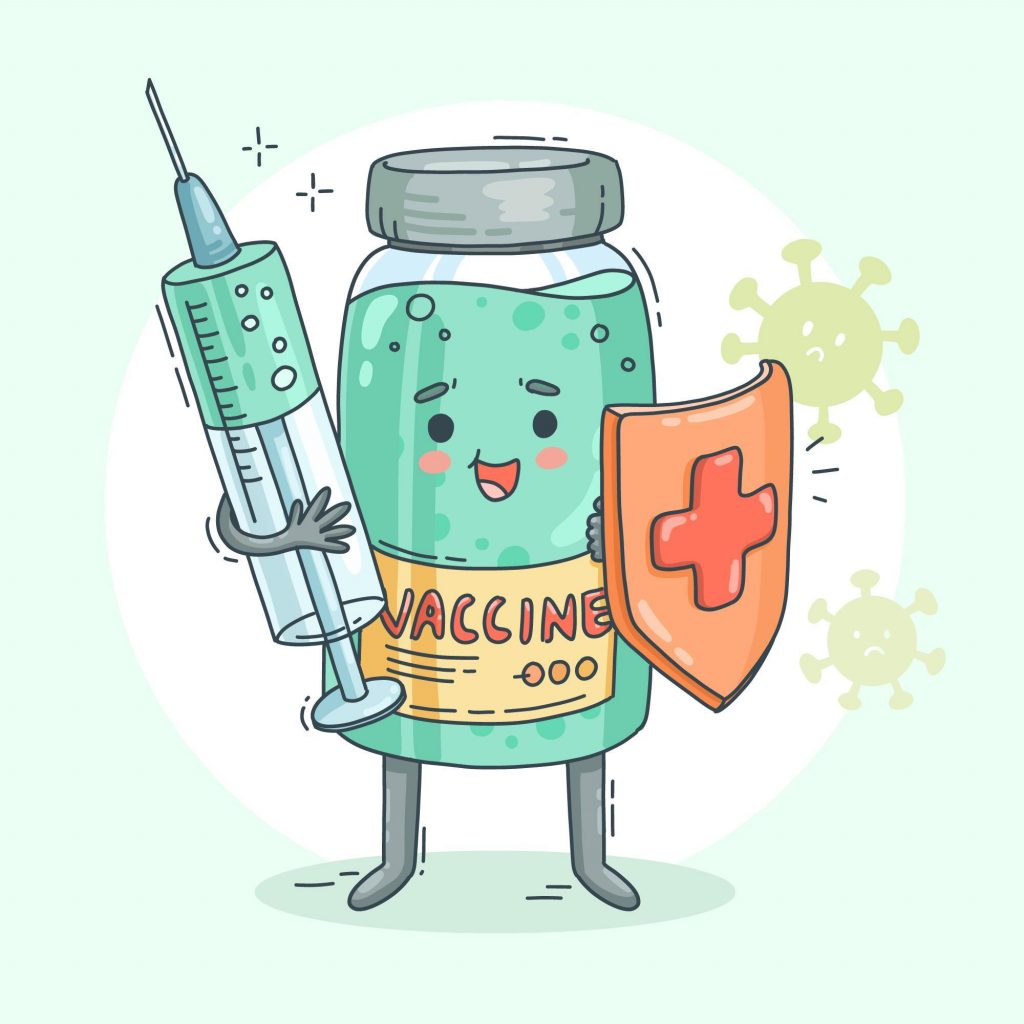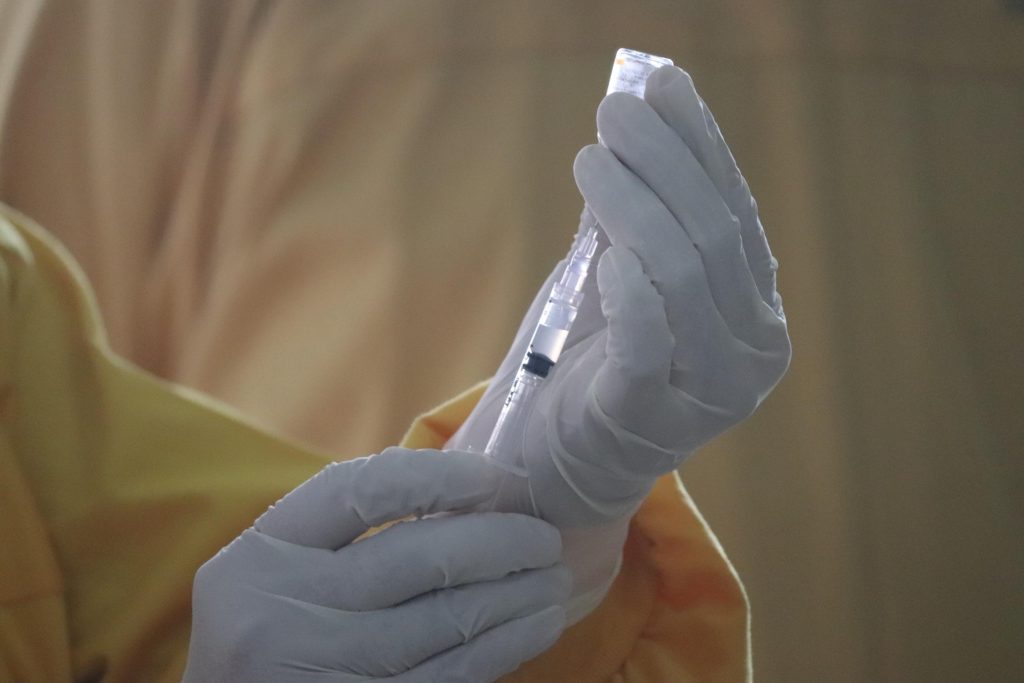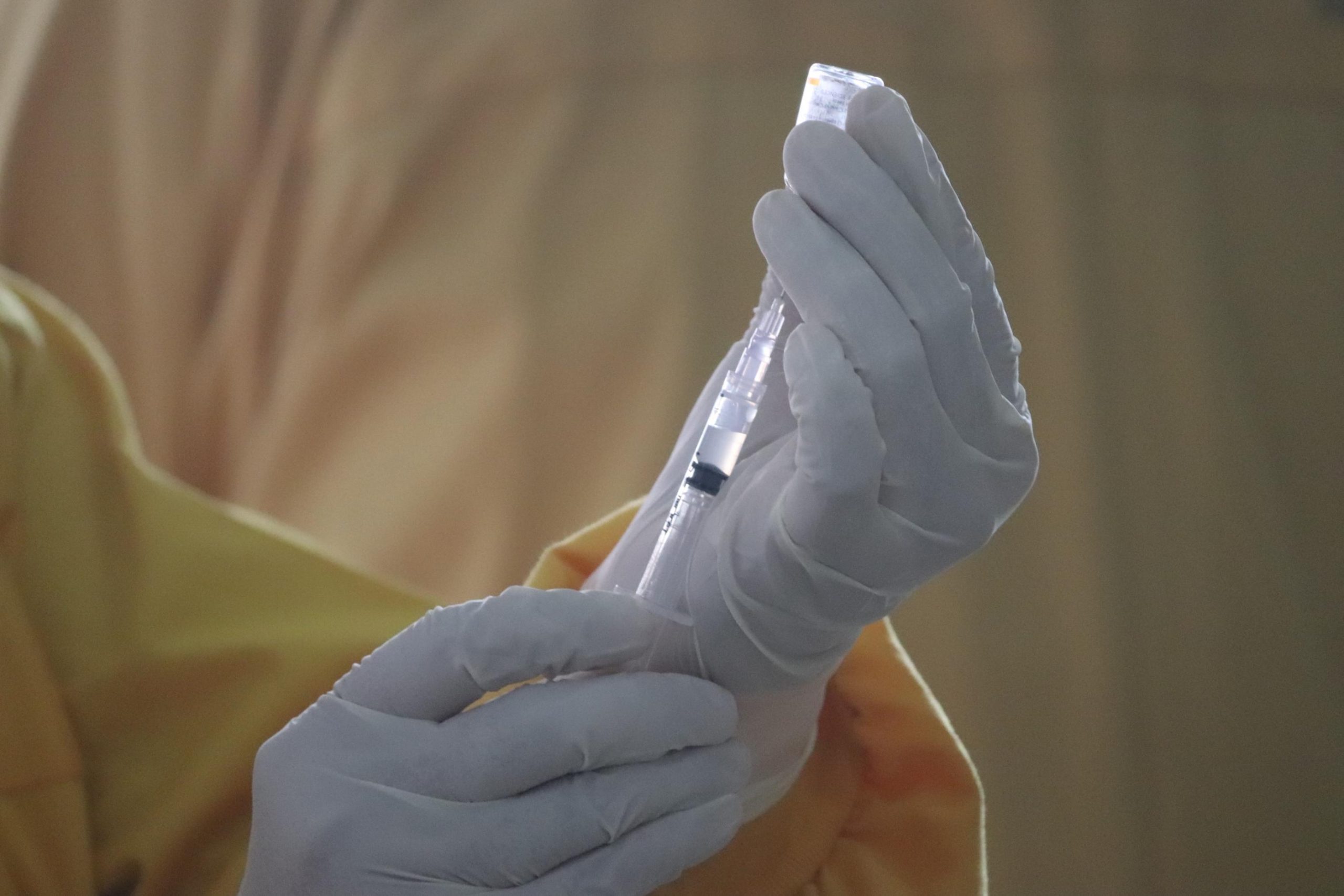Even though it has existed for ages, there is still some ambiguity around what a vaccine actually is. Some people think that taking a vaccine is dangerous, others are unsure about how much they help. This worsens when it involves children since the thought of injecting your child with a weakened strain of a virus can prove to be too daunting. So, to ensure that you feel safe about immunizing your kids, here are a few busted myths to clear your doubts about childhood vaccinations in India.

Unlike what the myths say, vaccinations are perfectly safe for your baby.
What Is A Vaccine?
Before we get to the part where we clear your doubts about childhood vaccinations in India, let’s go over the basics. A vaccine is something that helps your body develop antibodies to combat the particular infection that it is trying to fight. It gives the body a ‘trial fight’ of sorts. A vaccine is usually a weakened strain of the infectious organism or some variant of it. It tricks the body into thinking that it is fighting the actual virus.
The injected version of the virus is not harmful to you, and your body is completely capable of dealing with it. The vaccine prepares the body for fighting the virus in the future. This is the main objective of the vaccine. It does this by triggering the immune system to produce antibodies, which then remain in your body and ward off the virus if ever you do come into contact with it again.
There are four main types of vaccines:
- Live-attenuated vaccines – Live-attenuated vaccines have weakened living organisms in them that have become avirulent, and can no longer cause disease. E.g. Chickenpox, measles, mumps, rubella.
- Inactivated vaccines – It is by definition is a vaccine consisting of virus particles, bacteria, or other pathogens that have been grown in culture. They have no disease-producing capacity whatsoever. E.g. Hepatitis A, Rabies
- Subunit, recombinant, polysaccharide, and conjugate vaccines – These types of vaccines only use only a specific part of the germ i.e protein, sugar or capsid. E.g. HPV
- Toxoid vaccines – Toxoids are inactivated forms of toxins that are secreted by bacteria. These can no longer cause diseases. Eg. Tetanus, diphtheria
Clearing Your Doubts About Childhood Vaccinations In India
Myth 1 – Vaccinations Are Not Necessary
Fact – Even though vaccinations are not mandated or enforced by the government, they are all necessary if you want your child to live a healthy life and not pose a threat to other people around.
Childhood immunization will help keep your baby safe from some very life-threatening diseases. Vaccines trigger your baby’s immune system with a harmless virus. This ensures that your baby’s body will fight back effectively with the right antibodies if ever it comes in contact with the virus.
In addition, an unvaccinated child poses a threat to other people. If you do not get your kids vaccinated, you risk exposing them to diseases that have all but vanished from the general public. If parents stop vaccinating their kids, they risk their children contracting life-threatening diseases from foreign sources and then spreading them in local communities.
Myth 2 – Kids Can Get Infected With The Virus Because Of The Vaccine
Fact: Vaccines cannot cause diseases. They do not contain active viruses.
Vaccines are made with either inactive viruses, polysaccharides (complex sugars extracted from the virus), toxoids (inactivated forms of toxin secreted by the virus), or some other combination. None of these bear the threat of the actual disease or illness. When the vaccine enters the bloodstream, it activates the body’s antibody-producing mechanism.
Vaccines essentially trick the body into thinking that it is fighting the actual virus. The most that a vaccine will do to your child’s body is produce some minor side effects like fever and swelling. But in no way can it actually give your baby the disease.
Myth 3 – Vaccines Contain Chemicals That Are Harmful For Kids
Fact – Vaccines do contain chemicals, but they are not harmful.
Every edible thing on this planet has chemicals in it. Even apple pips have traces of cyanide (a poisonous substance) in them. But these are not always harmful. There are trace amounts of chemicals like mercury and aluminum in vaccines. But contrary to what you think, they actually make your child’s vaccine safer.
Our bodies actually naturally produce formaldehyde, a chemical that is present in vaccines, in a much higher quantity. Plus, there is no scientific evidence that proves that these low levels of chemicals in vaccines can actually be harmful or cause long-term damage.
Myth 4 – Not Vaccinating Will Only Affect My Child
Fact – Even though vaccines immunize your child, it is possible for them to contract the disease from someone else.
Smallpox, polio, and measles were all highly infectious and in some cases deadly diseases. The regular vaccination of children reduced their spread. Smallpox was eradicated from India by 1975, thanks to the smallpox vaccine. The polio vaccine was introduced in 1994 when India accounted for more than 60% of the world’s polio cases. Due to rapid immunization, by 2014 there wasn’t a single case of polio in India.
But by leaving your child unvaccinated to these and other diseases, there is a risk that they can contract any of them. This then poses a threat to other children and people, especially to the unvaccinated with autoimmune disorders. An unfortunate real-life incident of the same is when communities in Minnesota, USA saw a sharp rise in Measles cases after having kept the virus at bay for decades.
Your decision to not vaccinate your child could cause damage to the community as a whole.
Myth 5: The Vaccine Schedule Is Too Rushed And Aggressive
Fact: Vaccination schedules are created by keeping in mind the optimum window in which the vaccine will be most effective.
Pediatricians in India will follow one of two vaccination schedules – the National Immunization Schedule (NIS) or the Indian Academy of Pediatrics (IAP) schedule.
The NIS has 15-20 recommended vaccines as a part of it, while the IAP schedule has an additional 20 vaccines. A popular myth around vaccinations is that the vaccination schedule is rushed, and that the vaccines can actually be spaced out and given with longer intervals between two doses.
You don’t need to worry about the schedule being too cramped. Children come in contact with millions of germs every day. The vaccines are actually milder, non-infectious forms of germs, and they will not cause any harm to your babies apart from a few common side effects.
The schedules are created to maximize the efficiency of each individual vaccine. So, you should not try to modify the schedule in any way. Consult your pediatrician to understand what is the vaccination schedule for your child, and why it is important to follow it as it is.
Myth 6: Vaccines Cause Autism
Fact: There is no evidence that suggests that autism is brought about due to vaccinations.
Researchers and scientists have debunked the myth that vaccines play a part in causing autism in children. The myth started in 1998 when a now-former British physician published an article in the prestigious Lancet journal claiming a connection between the MMR vaccine and autism.
The primary cause of concern was said to be a mercury-based preservative called Thimerosal. Ever since 2003, the American CDC has funded 9 different studies, all of which have concluded that there is no link between autism and vaccinations. The physician’s medical license has since then been revoked.
Scientists are still researching what exactly causes autism, with several studies on the same. But the statement that vaccines cause autism is nothing but a misinformed myth.

Take your doubts to a doctor or pediatrician, who can help you understand vaccines better.
The Dangers Of Vaccine Hesitancy
India began its immunization drive in 1978, under the guidance of the Universal Immunization Programme. Yet, we are falling behind on vaccinating our children. A major chunk of people with vaccine hesitancy don’t have access to a lot of socio-economic benefits and are thus more susceptible to conspiracy theories and rumors.
However, there are some who avoid vaccinations due to their general lack of information. They end up believing in many myths, making vaccine hesitancy a real danger. It poses a threat to us all, and especially to the young and weak. When in doubt, ensure that you consult with a pediatrician. Don’t let fear, rumors, and misinformation get the better of you.
Conclusion
The objective of any vaccine is to keep your child safe from some acute and infectious, but ultimately preventable diseases. Every vaccine your child receives is more than capable of fulfilling this requirement. Don’t give in to the many myths and doubts about childhood vaccinations in India. Instead, prioritize your baby’s life and the lives of those around you.
FAQs On Doubts About Childhood Vaccinations In India
What Are 3 Vaccines For Children?
BCG for tuberculosis, oral polio, and the measles vaccine are the three earliest vaccines that children receive. Overall, kids are given around 16 vaccines including booster shots, before the age of 16.
Are Vaccines Effective?
The general public has access to the vaccines only after extensive testing, and multiple phases of trials of the vaccines. Positive results in the majority of the cases lead to an approval of the vaccines.
What Are The Side-effects Of Vaccines?
Most vaccines have a general set of side effects. These side effects are a result of your child’s immune system fighting off the pseudo-infection. The vaccine enters the bloodstream and causes the pseudo-infection. Some common side effects include fever, swelling, and sometimes small red bumps on the site of the injection. All these side-effects are completely normal, and you have no reason to worry about them.
What Is An Immunization Schedule?
It is a set of dates giving you the time frame to have your baby vaccinated against a specific virus. For instance, the BCG vaccine is always given at birth or immediately after. Similarly, every vaccine has a specific timeframe.






